You’ll typically need €1,000–€1,400/month for a one‑bedroom in Barcelona, with studios and rooms cheaper if you share or live outside the centre. Expect €785–€962/month extra for single-person living costs (groceries €250–€300, utilities €120–€300, transport €22–€25 monthly card). Families face €2,760–€3,410/month in non-rent expenses; childcare and international schools add substantially. Plan a €450–€600 realistic monthly budget for non-rent singles and keep reading for concrete saving strategies.
Is Barcelona Expensive to Live In?
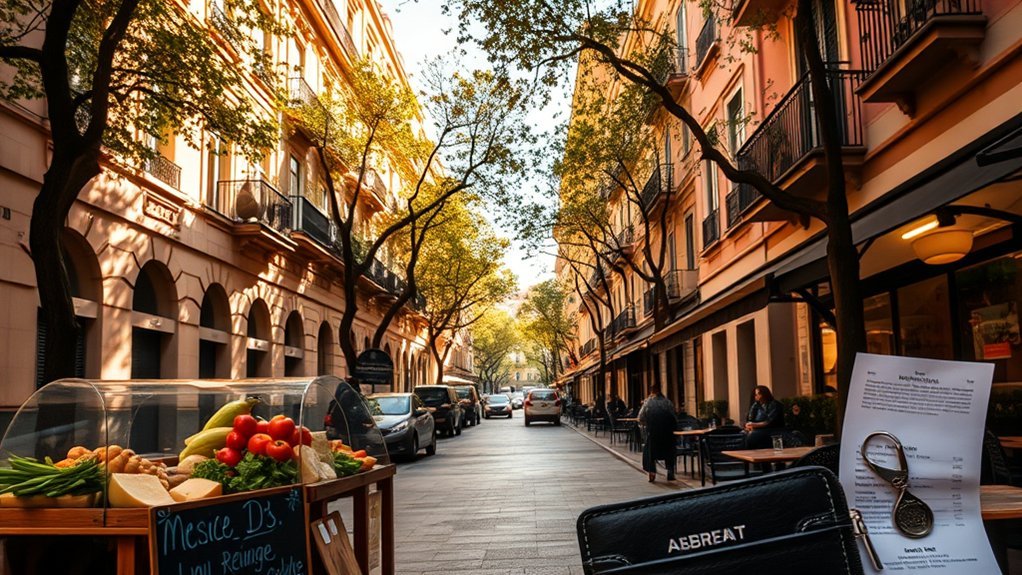
Although Barcelona isn’t the priciest city in Europe, you’ll still find it moderately expensive—it’s the second-most costly in Spain after Madrid but about 25–34% cheaper than cities like Amsterdam or London.
If you’re weighing living in Barcelona, focus on numbers: monthly costs excluding rent run roughly €785–€962 for a single person, while a family of four needs about €2,760–€3,410.
Rent drives expenses—studios and one-bedroom flats vary widely—so compare housing to local wages (average net ≈ €1,900).
Groceries for one are typically €250–€300 monthly if you shop local markets; eating in tourist zones raises bills.
Public transportation is efficient and helps contain costs, especially as an expat avoiding taxis.
You’ll find an affordable cost of living in some areas, but affordability depends on your rent choice and lifestyle.
Additionally, understanding local housing prices can significantly impact your budget planning.
Plan using specific rent and monthly cost figures to judge whether Barcelona fits your budget.
Monthly Rent and Housing Breakdown
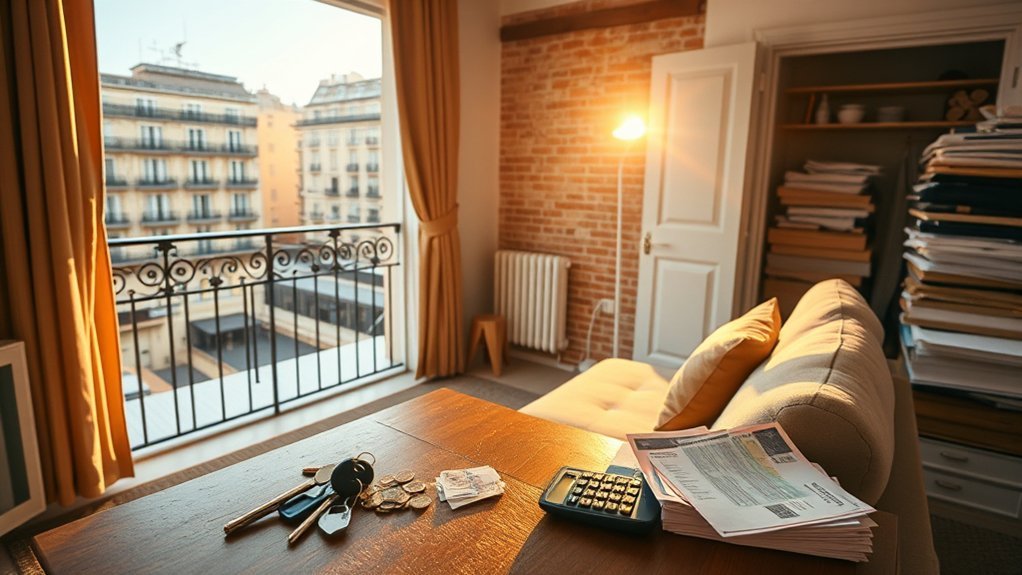
Having looked at overall monthly costs, you’ll want to zero in on rent since it’s the biggest driver of your budget.
Expect the average monthly rent for a 1‑bedroom city centre to be about €1,200–€1,358, while outside centre it’s closer to €1,085–€1,150. Studio rents sit around €1,150–€1,219, and private rooms near €625.
If you need more space, a 3‑bedroom outside centre averages roughly €1,474–€1,676, versus €2,025–€2,125 in the centre.
Neighbourhood price differences are sharp: affordable neighbourhoods like Nou Barris, Sant Andreu and Horta‑Guinardó cost much less than Sarri‑Sant Gervasi or Eixample.
Factor move‑in costs: landlords commonly require 2–3 months’ deposit plus the first month and possible agency fees; buyers should plan a ~30% down payment.
Watch rent trends and caps — rents have been rising, and local proposals aim to limit increases.
Use this breakdown to match location, size and upfront costs to your budget.
Typical Utility and Internet Costs
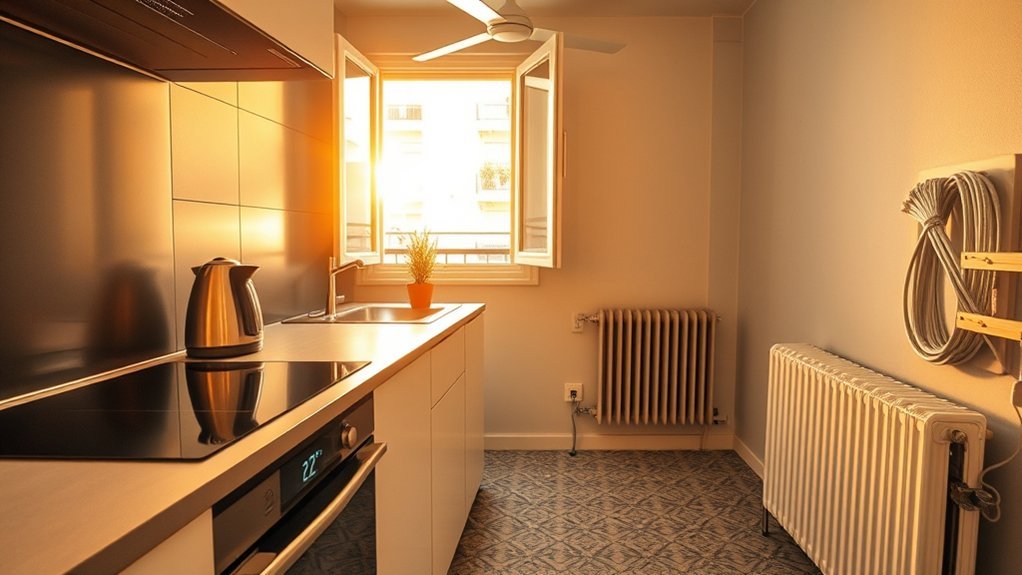
For an 85–100 m² flat you’ll typically pay €100–€250/month for basic utilities (electricity, water, garbage, heating/cooling), with bills often hitting €200–€250 in extreme winter or summer months. Internet with 60+ Mbps fiber runs about €20–€40/month, and mobile plans with 10+ GB cost roughly €10–€25/month. Note that some leases include a small portion of utilities, but most require you to set up and pay meters and contracts separately. Additionally, implementing a repair budget can help manage unexpected expenses related to utility services.
Monthly Utilities Breakdown
Expect to pay roughly €100–€250 a month for basic utilities (electricity, heating/cooling, water, garbage) on an 85–90 m² apartment, with costs skewing higher in winter for heating or in summer for air conditioning.
You’ll typically see combined monthly bills (utilities + Internet) land around €120–€300, depending on usage and whether the landlord offers rent included options.
Electricity and heating drive the variance; water and garbage are usually smaller, stable line items.
Internet (60 Mbps+) commonly costs €20–€40, and mobile plan costs vary separately, so check whether data is bundled.
Only a minority of listings include utilities, so confirm what’s covered before signing.
Use these averages to budget realistically and prepare for seasonal spikes.
Internet and Mobile Costs
Alongside your electricity and heating bills, internet and mobile costs are predictable line items you should budget for.
Home broadband (60 Mbps+) typically costs €20–€40 monthly, with common plans averaging about €32.36. A mobile plan with 10GB+ of data usually runs €10–€45 per month; mid-range packages land near €19.50.
Many providers offer a bundle—mobile plus fixed internet—that trims the total, so combined monthly bills for basic household needs often stay under €50–€60.
Public Wi‑Fi and coworking spots are available, but you’ll want paid home broadband for consistent speeds, remote work, and reliability.
Remember electricity, water and heating are billed separately and add roughly €150–€250 to household utilities.
Grocery and Eating Out Prices

You’ll find monthly groceries for a single person typically cost €250–€300, with staples like milk €1.12/L, bread €1.74 (500 g), rice €1.64/kg and eggs €2.93/dozen.
Eating out ranges from about €15 for an inexpensive meal to €63 for a three-course mid-range dinner for two, while drinks vary (beer €1.20–€4 in bars, wine ~€6 in shops).
Cooking at home with seasonal market produce (tomatoes €2.29/kg, bananas €1.93/kg, potatoes €1.72/kg) is a clear way to lower your monthly food bill.
Grocery Costs Breakdown
Groceries and meals in Barcelona are reasonably priced compared with many Western European cities, and you can plan fairly accurately using typical ranges: a single person spends about €250–€300 per month on groceries, while a family of four will generally pay €400–€700 depending on where and how they shop.
You’ll find supermarket prices like 1 L milk €1.12, 500 g bread €1.74, 1 kg rice €1.64, and a dozen eggs €2.93. Markets offer affordable local produce such as bananas €1.93/kg and tomatoes €2.29/kg, useful if you’re cooking at home.
To manage costs, focus on staples and markets:
- Buy seasonal produce at markets.
- Stock rice, pasta, and legumes.
- Compare supermarkets weekly.
- Cook at home more often.
Eating Out Expenses
Eating out in Barcelona won’t break the bank if you know where to look: casual meals average about €15, a three-course mid-range dinner for two runs roughly €63, and lunchtime “menu del día” deals often give you multiple courses, a drink and bread for €10–€15.
You’ll stretch your food budget by balancing eating out and cooking: monthly groceries usually run €250–€300, with staples like rice €1.64/kg, milk €1.12/L and eggs €2.93/dozen.
For coffee and drinks expect a cappuccino around €2.59 and a 0.5 L local beer €1.20–€3.50.
Use cheap restaurants and menu del día offers for value, and shop markets like Boqueria or budget supermarkets such as Mercadona, Lidl or Aldi to cut costs.
Transport, Leisure and Personal Services
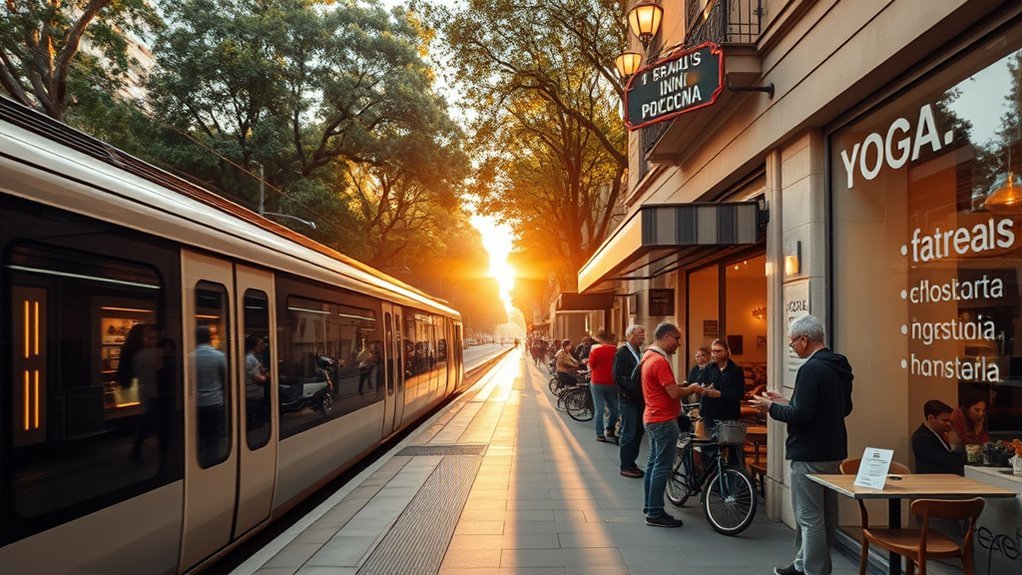
While Barcelona’s public transport is affordable and reliable, how much you spend will depend on how often you travel and whether you stick to city zones. The public transportation system offers a metro one-way ticket at about €2.50, but if you commute regularly a monthly travel card (€22–€25 depending on zones) saves you money. Taxi fares start at roughly €3 with ~€2/km plus small surcharges for nights or airport trips.
Consider these typical monthly or per-use costs to plan your leisure and personal services spending:
- Mobile plans (10GB+) — €19–€20/month.
- Home internet (60 Mbps+) — €30–€35/month.
- Gym membership — €45–€50/month; cinema ticket — €9–€10 each.
- Leisure budget (activities, eating out) — €200–€300/month; tennis court rental ~€18–€20/hour. Additionally, regular inspections of your air conditioning system can help prevent unexpected costs related to repairs.
Use the numbers above to set a realistic leisure budget and decide if pay-per-ride or a monthly card fits your travel patterns.
Family Expenses, Childcare and Education
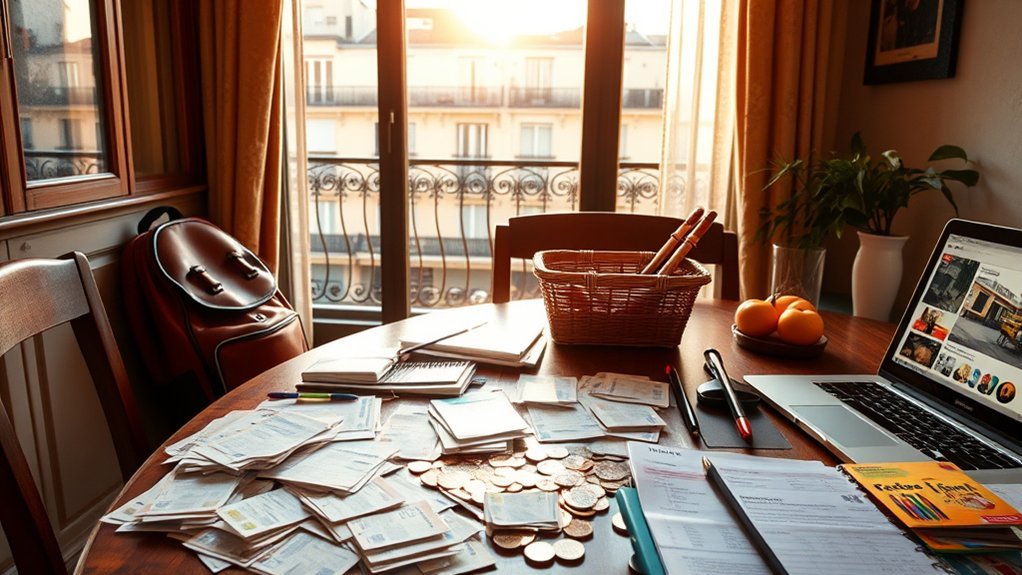
If you’re moving to Barcelona with young children, plan childcare and schooling as one of your biggest recurring expenses: public subsidized nurseries cost about €150–€200/month for 0–3-year-olds, private nurseries average ~€300/month, and full‑day private preschools run roughly €593–€623/month.
Childcare costs vary by type and hours: monthly childcare can range €150–€900+ per child depending on public nurseries, private nurseries, preschools and extras like extended hours childcare. International school tuition is substantially higher — expect roughly €10,000–€15,000/year for many primary schools, with top schools charging more.
To enrol, prepare registration documents: child’s birth certificate and parents’ DNI/NIE among others; schools often require proof of residence and employment.
Working mothers may qualify for a working mothers tax deduction up to €1,000/year, which you should factor into net cost calculations. Additionally, understanding operational expenses is crucial for budgeting effectively when planning for family living costs.
Compare preschool fees, service hours and contract clauses carefully before committing, and request full fee breakdowns to avoid unexpected extras.
Budget Examples and Money‑Saving Tips
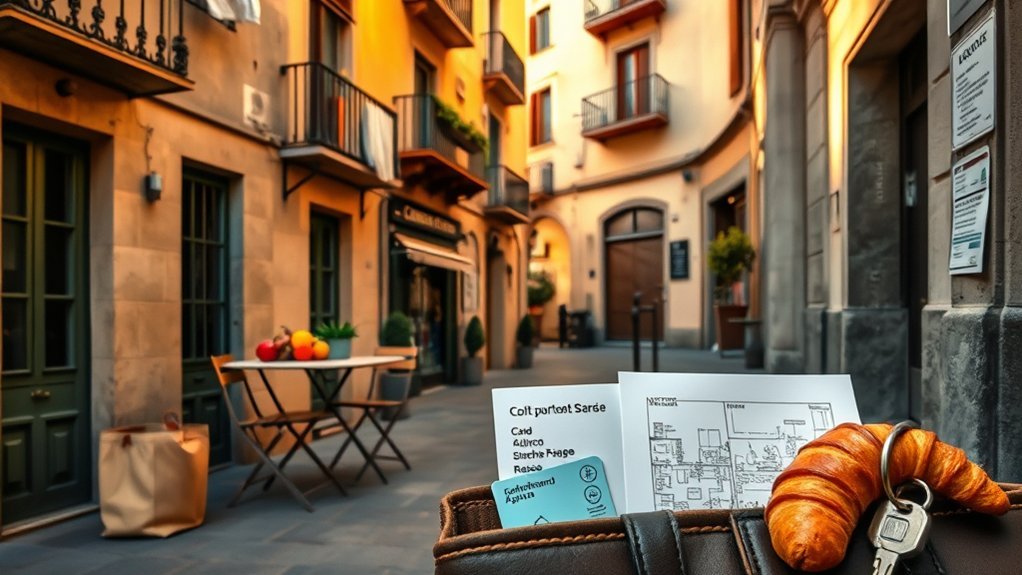
Because small choices add up fast, plan a realistic monthly budget that matches your lifestyle and housing choices: a single person can aim for total non‑rent spending of about €200–€300 plus groceries of €250–€300, while a family of four should budget €400–€700 for groceries and correspondingly higher discretionary costs. Use these examples and tips to control living prices in Barcelona.
Plan a realistic monthly budget—small choices add up: singles €450–€600, families higher; track spending and adjust housing/transport.
- Share a Rental or live outside centre — studio averages €1,150–€1,219; one‑bed city‑centre €1,200–€1,358; splitting an apartment cuts per month rent dramatically.
- Buy market produce — Mercat de Sant Antoni or Boqueria lowers groceries vs supermarkets.
- Use public transport — monthly T‑zone €22–€25 beats single tickets; student options available.
- Choose cheap meals — cook at home or use menu del día/tapas (~€10–€15) and pick low‑cost leisure (gym €30–€50, cinema €8–€10).
Tracking spending weekly can also help you set a budget for periodic equipment upgrades and adjust housing or transport choices to meet your financial targets.
Track spending weekly, set limits for discretionary items, and adjust housing or transport choices to meet your financial targets.
Frequently Asked Questions
How Much Is Rent per Month in Barcelona?
You’ll pay roughly €625 for shared flats, €1,150–€1,358 for studio apartments or 1‑beds, €1,474–€2,025 for larger units; neighborhood differences, short term rentals, furnished options, utility bills, rental contracts, security deposits, roommate apps matter.
Can You Live in Spain With $2000 a Month?
Yes — you can live on $2,000/month in Spain if you prioritize cost sharing, remote work or job prospects, maintain a savings buffer, handle tax implications, explore visa options, use local banking, access healthcare, and take language classes.
How Much Does It Cost to Live Comfortably in Barcelona?
Think of Barcelona as a mosaic you’ll live in: you’ll need €1,900–€2,500 monthly for neighborhood vibe, rent, monthly utilities, groceries budget, transport costs, healthcare access, entertainment expenses, dining out, language classes and co working spaces.
Is It Cheaper to Live in Spain Than the USA?
Generally, yes — cost comparison shows Spain’s grocery prices, transportation costs and housing market are lower, but you’ll weigh salary levels, tax differences, healthcare access, education expenses and quality of life to judge overall affordability for you.
Conclusion
Living in Barcelona balances sunlit rewards with practical costs: rent is the mountain you’ll plan around, utilities and groceries the steady river shaping your days. You’ll budget transit, leisure, and childcare like careful gardeners tending varied beds—some costly blooms, some cheap herbs. Use data to prune expenses: compare neighborhoods, share housing, and track monthly bills. With clear planning, Barcelona’s mosaic of costs becomes a manageable map toward a life you actually want.


